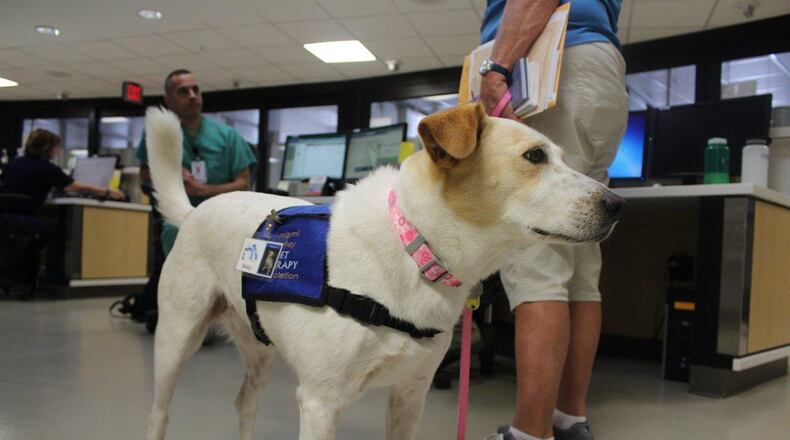In 2011, Gerry Coen was a patient in the hospital recovering from a surgery. Having a pet therapy dog of her own, she inquired if her dog could visit her to help provide comfort as she recuperated.
Andersen said at that time the 88th Medical Group were not able to honor her request as they did not have a pet therapy program in place. Cohen stepped forward and offered to assist with getting a pet therapy program established at the hospital.
After much consideration, the 88th Medical Group started to look into how it could make a pet therapy program happen and also how both patients and staff could benefit from it.
“After researching what it would take to start a pet therapy program, we realized to run the program, there would be no expenses incurred,” Andersen said. “Dog handlers own their dogs and are financially responsible to go through the certification process, carry insurance for liability and cover all veterinary exams and vaccines.
Coen, who is now the president of the Miami Valley Pet Therapy Association, a 501(c)(3) all-volunteer organization, said the program currently has approximately 90 active handlers who own a variety of animals. Some of the animals used in the pet therapy program are rabbits, miniature horses, cats, guinea pigs and dogs.
Currently dogs are the only animals allowed at the 88th Medical Group and are taken throughout the hospital seven days a week. Areas where patients or staff members have allergies or fear of dogs are avoided.
To qualify as a pet therapy pet, handlers and their dogs must go through a nine-week course where they will be exposed to many sights and sounds, such as being around wheelchairs, gurneys, canes and being in large groups of people.
In addition to the nine-week course, all dogs must receive physical examinations every six months and be up to date on all vaccines. Prior to visiting the hospital, dogs must be bathed 24 hours in advance.
Andersen said the biggest benefit she has seen with the program are the smiles and joy people have when they see the dogs.
“We have patients here that may be feeling lonely because they do not have family living close by or may be widowed but when they see the dogs, their faces light up,” Andersen said.
Andersen recalled a day when she saw the positive effects of the pet therapy program.
“One day I stopped to talk to a gentleman in the atrium who appeared to be upset. While I was talking to him, a therapy dog approached him,” Andersen said. “After spending some time with the dog, he then shared with me that he had been having a bad day, but the dog’s visit made a big difference and he felt better. He later called me to find out what days the dog visited the hospital so he could schedule his appointments on the same days so he could see the dog.”
Maj. Gary Webb, 88th Medical Group inpatient critical care flight commander, is also a believer of the power of pet therapy.
“From a nursing standpoint, you cannot put a value on pet therapy,” Webb said. “Working in the critical unit we provide a higher level of care for our patients so the tempo can be high. Yes, they are here for the patients first, but when our staff are having a busy day, the dogs take them away from that even if it is just for a few minutes.”
Because of the nature of the one-on-one care in the intensive care unit, Webb said he and his staff connect quickly with their patients. He described a day he and his staff were emotional when a patient they became close to passed away. Right before the end of their shift that day, a therapy dog unexpectedly showed up.
“The timing of the dog could not have been more perfect, and we were able to end the shift on a positive note,” said Webb. “Honestly, I think pet therapy does more for us than the patients, we don’t have to worry about anything else but just pet the dog.”
First Lt. Gregory Caliwag, 88th Medical Group critical care clinical nurse, said getting visits from a pet therapy dog also helps him provide better medical care for his patients.
“Taking a few minutes during a busy day to spend time with a pet therapy dog helps me to de-stress, refocus and re-energize my efforts to provide the best care to my ability,” Caliwag said.
Along with providing services at the 88th Medical Group, the Miami Valley Pet Therapy Association also provides pet therapy services at the child development centers and does weekly visits to the National Air Space Intelligence Center.
“Pet therapy is total patient care,” Andersen said. “Unconditional love, it doesn’t matter what your disabilities are, your limitations, dogs do not judge you and they are just there to give you love unconditionally.”
If your organization is interested in a visit from a pet therapy dog, contact the 88th Medical Group patient advocate office at 257-9131, or e-mail synthie.andersen@us.af.mil. For additional information on the Miami Valley Pet Therapy Association, go to mvpta.com.
About the Author
